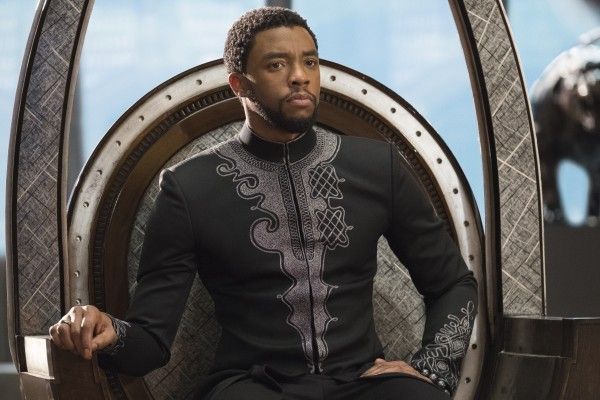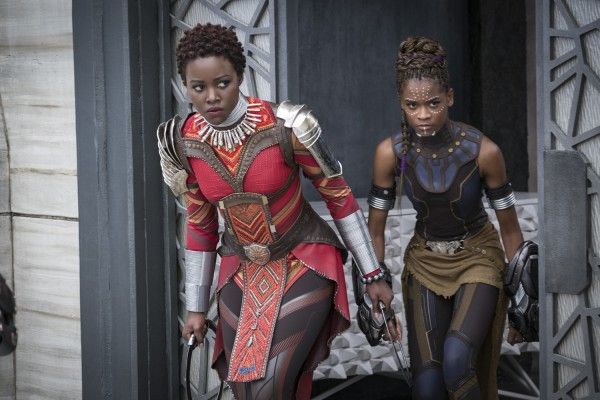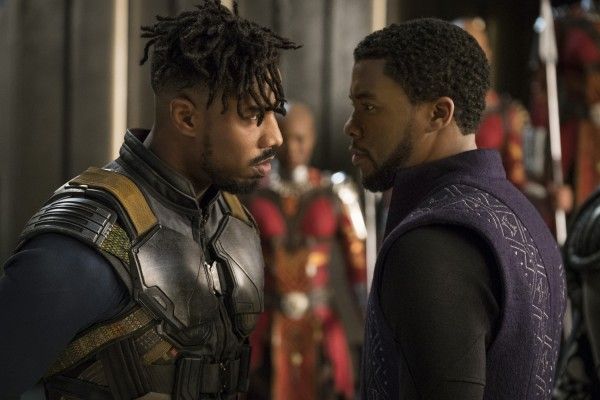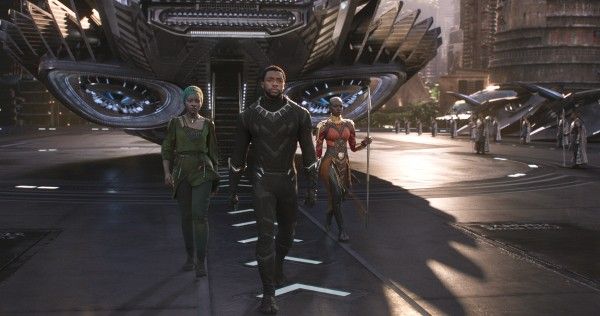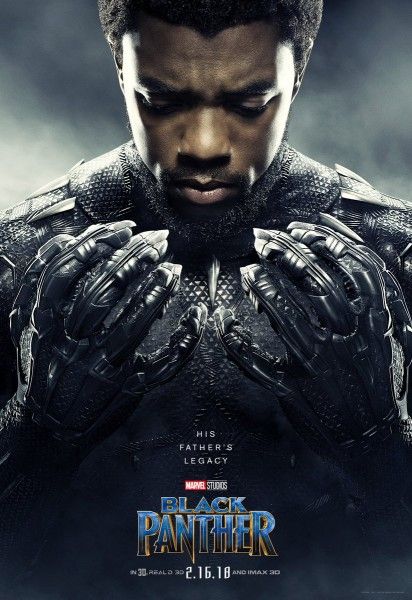Black Panther is Marvel's boldest movie yet, and fortunately, it's also one of its best. As a studio, Marvel has thrived by redefining the constructs of serialized cinematic storytelling, honoring the comic book characters fans love, and allowing filmmakers to put their singular stamp on the material. Back Panther checks all those marks, but it's also allowed to be more insular than the average Marvel movie; a decision that proves not just beneficial, but essential when you realize the full weight of the story it wants to tell. Because Black Panther isn't just a crowd-pleasing superhero movie (though it is that for sure), it's a vital moment in cinema history and a heartfelt, thoughtful exploration of the scars of colonialism and the hope for healing.
Directed by Creed and Fruitvale Station helmer Ryan Coogler, Black Panther picks up with Chadwick Boseman's T'Challa after the events of Captain America: Civil War and his father's untimely death when he returns to his homeland and takes the throne as new king of Wakanda. After a brief glimpse in the Civil War post-credits, we finally get to see the kingdom in all its glory; a wondrous, Afrofuturist land of technology and rich, unhindered culture thriving in modern times, though kept secret from the world. Marvel has made a habit of taking us to spectacular new realms in their recent films, and Black Panther proudly carries that torch. Production design, costumes, and of course, visual effects are all on point, and newly minted Oscar-nominee Rachel Morrison shoots every frame to embrace the sumptuous detail.
But it's the people of Wakanda that bring it to life. T'Challa is surrounded by friends, family, and rivals, each so charming and entertaining they're constantly stealing scenes from each other. There's Angela Bassett as the Queen Mother Romonda, ever poised and elegant, Forest Whitaker as T'Challa's wise mentor Zuri, and Daniel Kaluuya as T'Challa's old friend W'Kabi. Winston Duke is also a standout as the fierce M'Baku, a challenger to T'Challa's throne who's full of surprises.
Then there are the warrior women of Wakanda, who will steal your heart. Lupita Nyong'o is Nakia; a spy determined to help the helpless tribes of Africa who have not had Wakanda's abundance. She's radiant and clever, and it's easy to see why T'Challa's former lover still holds his heart, but N'yong'o elevates Nakia beyond a standard love interest. Danai Gurria is Okoye, general of the elite Wakandan female guard known as the Dora Milaje, who is unwaveringly loyal to king and country. Gurira has earned a reputation as a badass from her work as the sword-swinging Michonne on The Walking Dead, but she is given more spotlight in Black Panther, and my, she is a sight to behold -- particularly during the film's second-act Casino set-piece. Draped in a stunning red gown, Okeye is a force of grace and power, and she's quite literally breathtaking -- as in, I felt the air involuntarily whoosh out of my lungs during a particularly elegant maneuver.
Last, though certainly not least, there's Leticia Wright as Suri, T'Challa's teenage sister -- the smartest person in the world. I don't need to harp on how extraordinary it is to see an African teenage girl depicted as the smartest person in the world, especially when that world includes Tony Stark and Bruce Banner, but it is thrilling to think what that will mean for young girls looking for themselves on screen. Beyond the power of her presence alone, Wright makes Suri an absolute joy. She's not timid and bookish, or brash and arrogant, but jubilant and empowered by her genius. She loves to create just as much as she loves giving her brother shit, and she never hides behind her brains, as ready as anyone to jump in the fight. Keep an eye out for Wright; she's sure to be a breakout.
Black Panther also sees the return of Andy Serkis' Ulysses Claw, first introduced in Avengers: Age of Ultron, who has a long history in the Black Panther comics and, likewise, a long history with Wakanda in the film. Serkis is a riot in the role, clearly having the time of his life hamming it up as the silly, sinister goon, and it's through him that we meet the film's main antagonist, and he is a villain worthy of a king.
Black Panther pits T'Challa against Erik Killmonger, a hulking whirlwind of rage and charisma that whips through Wakanda with self-righteous fury. As played by Michael B. Jordan, Coogler's lucky charm, Erik is instantly likable, dangerously sexy, and capable of extraordinary violence. He hits so hard, he knocks off Loki's crown as the MCU's best villain. Erik's intentions and secrets are fairly obvious before they're revealed in full, but that doesn't lessen their impact. It's all too easy to have empathy for him, for the pain and suffering that led him down the wrong road, for the primal scream of injustice he represents. That conflict makes the journey infinitely more engaging and emotional, for T'Challa and the audience. Most good villains believe they're the hero of the story, and were his tactics less nefarious, Erik could be. His methods are unforgivable, but his message has weight -- he delivers a line in the third act that is shattering -- and it makes him the perfect antagonist to grind against T'Challa's beliefs and sharpen him into a better king.
Because it is about T'Challa, Black Panther is inherently a story about kings and kingdoms, which means it is also a story about fathers, bloodlines and generational strife. T'Challa has to confront the reality of his father's deeds beyond the legacy. He has to confront what it means to be a good man and if that's always the same thing as being a good king, and what it means to rule for the future, not for the past. "Just because something works doesn't mean it can't be improved," Shuri tells her brother. She's talking about her tech, but she's also the voice of the future. In this regard, Black Panther shares similar themes with Thor -- heavy is the crown and all that -- but if Thor is repeating a story that has been told a thousand times, Black Panther is telling it in a new way. It's rich material, pulled from the fiber of Shakespeare and Greek Tragedy, but form-fitted to T'Challa, king of an African utopia.
Because it is also about Wakanda, Black Panther is inherently a story about Colonialism and a vision of Africa that was allowed to thrive without the imposition of white culture and violence. Coogler doesn't shy from that element, he digs in and roots the story there. He mines the wellspring of history to tell a superhero story born of something much deeper. It's powerful, and it's worked into every element of the story, right down to T'Challa's suit. When he gets shot, his suit redistributes the kinetic impact against his opponent -- the injuries he suffers becomes a source of his strength. They say that if you don't see the value in representation, it's probably because you've always had it. Black Panther is not my representation, but the value is impossible to miss.
This movie is a game-changer, and for all the valid critiques you can throw at Marvel, the studio deserves credit for bankrolling Coogler's fearless vision. You have to go back to 1998, back to Blade and Wesley Snipes for the last time Hollywood launched a superhero franchise led by a hero of color. Since then, there's been Catwoman (oof) and supporting roles. Never in our lifetime has there been a superhero blockbuster so intently invested in the black experience, in the importance of identity and heritage, and the tragedy of being denied those things. There is so much heart, and heartbreak, in Black Panther. There's empowerment and pride. This is a movie that cuts deep and with the preternatural finesse of a filmmaking wizard, Coogler tackles some of the most painful, politically explosive subject matter of all time and folds it into a wildly successful piece of action entertainment so that the two aspects of the film become inseparable.
Black Panther isn't just a triumph because it's an important and unprecedented film, but because it's also a fantastic superhero movie and a joy to watch. It's a delicate, impressive balance. There are flaws to be found, but they are by and large the product of the Marvel mold; namely, the film is 20 minutes too long and has one-too-many minor antagonists, but they're minor faults that do little to detract from Coogler's overall success. This is a great Marvel movie, chock full of entertaining character beats and thrilling action -- nothing quite matches the intensity and intimacy of Coogler's fight scenes in Creed, but Marvel movies demand a different kind of spectacle and Coogler uses his command of character and geography that keep you invested in the action. During the third act battle, you're acutely aware of every character's position, how vital their role is to victory, and the mounting forces against them -- and he makes you worry about every last one of them.
Indeed, Coogler's skill as a filmmaker and storyteller is what makes Black Panther soar. He juggles tone with precision, delivering laughs to punctuate moments of breathless action and heart-rending drama. He and co-writer Joe Robert Cole flesh out the world and their characters with depth and warmth, and fuel their story with complicated, challenging ideas, building organically from real-world issues without giving pat answers or cheap consolations. Black Panther is kinetic and visually stunning, it's vital, timely storytelling with something to say. I walked out of the theater with Black Panther stuck in my heart the way a good song gets stuck in your head, and I'll be dancing to Coogler's tune for quite some time.
Rating: A-


